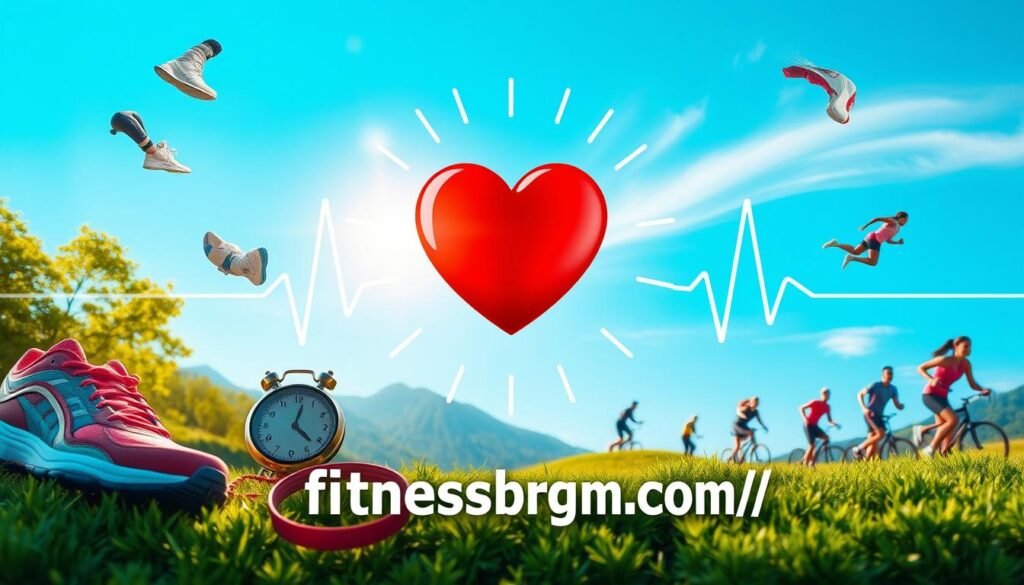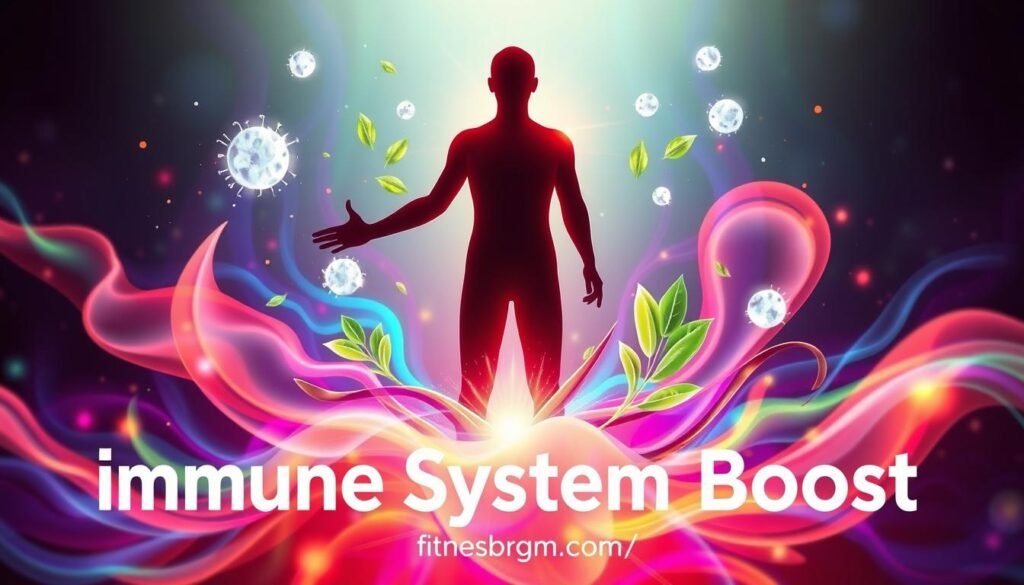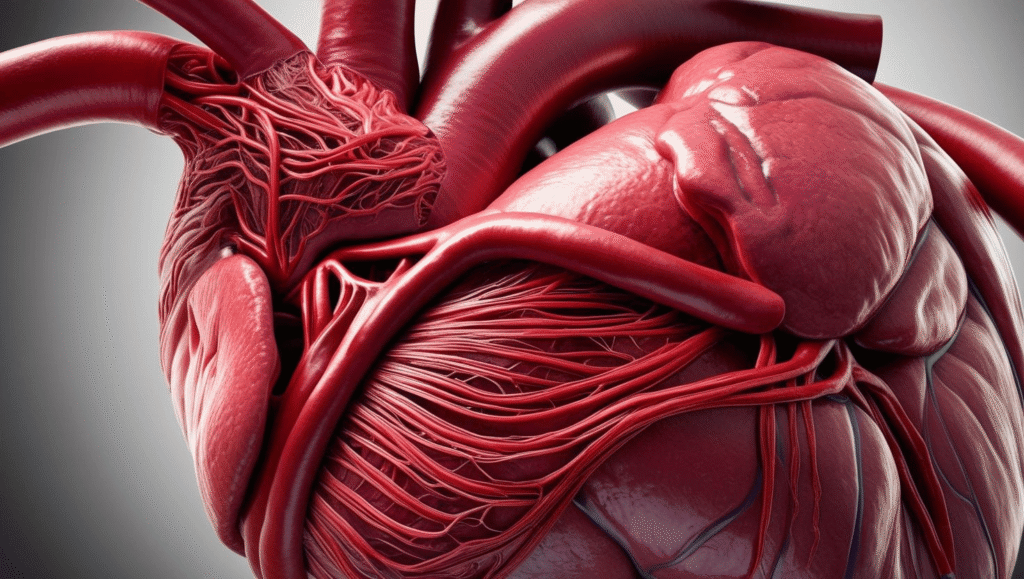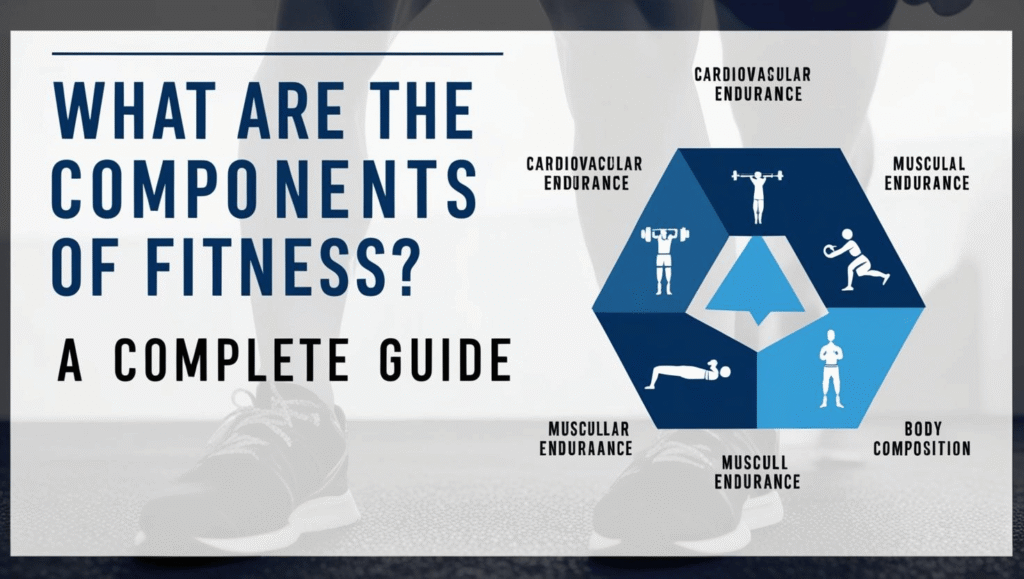Are you tired of feeling sluggish and lacking energy? Unlock the transformative power of cardio training and experience a surge of vitality that can redefine your overall well-being. Cardiovascular exercise, often referred to as “cardio,” is a surefire way to get your blood pumping harder and faster, leading to a myriad of benefits for your physical and mental health.
Key Takeaways
- Cardio exercise can lower the risk of early death by up to 30%
- Guidelines recommend 150 minutes of physical activity per week for adults
- Cardio can improve heart health, weight management, and endurance
- Cardio exercises can reduce stress and boost mental well-being
- Incorporating cardio into your routine can lead to increased energy levels and improved circulation
What is Cardio Exercise?
Definition and Examples of Cardio Activities
Cardio, or cardiovascular exercise, is any physical activity that gets your heart rate elevated for an extended period. The term “cardio” comes from the Greek word “kardía,” meaning heart, as cardio exercise is beneficial for your heart health. Aerobic exercise, such as cycling, running, rowing, swimming, walking, and hiking, are all examples of cardiovascular activities that fall under the category of cardio. You can also use machines like ellipticals, steppers, treadmills, and rowing machines to get a good cardio workout.
Aerobic exercise can be sustained for at least 30 minutes, working on both cardiovascular and muscular systems. Experts recommend incorporating aerobic exercise three to seven days a week, lasting at least 30 minutes per session. Beginners should aim for five to 10 minutes of continuous activity in their fitness routine, gradually increasing duration and intensity over time.
In contrast, anaerobic activities are short, fast exercises lasting typically 10 to 15 seconds and include weightlifting, HIIT, plyometrics, and calisthenics.
| Aerobic Exercises | Anaerobic Exercises |
|---|
- Running
- Biking
- Swimming
- Walking
- Hiking
- Rollerblading
- Treadmill
- Stair climbing
- Rowing
- Dancing
- Skiing
- Jumping rope
- Sports (basketball, soccer, hockey, volleyball)
- Weightlifting
- HIIT
- Plyometrics
- Calisthenics
“Aerobic exercise can be affordable and accessible, with options like walking, jogging, or taking advantage of free community fitness classes or online workouts.”
Cardiovascular Benefits of Cardio Training
Incorporating regular cardio exercise into your routine can provide remarkable benefits for your cardiovascular health. By the year 2030, the prevalence of cardiovascular disease in the United States is expected to increase by 9.9%, with heart failure and stroke rates expected to rise by approximately 25%. Adopting a consistent cardio regimen can help mitigate this alarming trend and keep your heart strong and resilient.
One of the primary advantages of cardio is its ability to lower resting blood pressure and heart rate. Regular exercise routine can help lower blood pressure, and people who exercise regularly are less likely to take up smoking as a habit. This means your heart doesn’t have to work as hard all the time, reducing the strain on this vital organ. Additionally, cardio can help improve your cholesterol profile by increasing good HDL cholesterol and controlling triglycerides.
The benefits of cardio training extend beyond just heart health. Combining aerobic exercise with resistance training produces the greatest benefits for managing heart disease, and guidelines recommend a minimum of 30 minutes of aerobic exercise at least five days a week, along with moderate weightlifting twice a week for muscle toning and endurance. By following these guidelines, you can significantly reduce your risk of cardiovascular issues and enjoy a healthier, longer life.
| Cardiovascular Benefit | Impact |
|---|---|
| Reduced Blood Pressure | Regular cardio can lower resting blood pressure and heart rate, reducing the strain on the heart. |
| Improved Cholesterol Levels | Cardio helps increase good HDL cholesterol and control triglycerides, improving overall cholesterol profile. |
| Decreased Risk of Heart Disease | Consistent cardio routine can significantly reduce the risk of developing cardiovascular issues. |
Investing in your cardiovascular health through regular cardio exercise is a proactive and effective way to safeguard your overall well-being. The total direct cost for healthcare due to cardiovascular disease is estimated to reach $818 billion, with an additional total indirect cost of $275 billion attributed to lost productivity. By prioritizing your heart health, you can not only improve your quality of life but also contribute to the reduction of these staggering healthcare costs.
Incorporating cardiovascular exercise into your lifestyle is a remarkable investment in your long-term health and well-being. Regular exercise leads to improved oxygen consumption, longer treadmill endurance, and lower heart rate and blood pressure, reflecting improved cardiovascular health. By making cardio a consistent part of your routine, you can unlock a wealth of heart health benefits and enjoy a more vibrant, energetic life.
Brain Benefits of Cardio Exercise
Cardio exercise doesn’t just benefit your physical health – it can also have a positive impact on your brain. Research suggests that regular physical activity can help protect the brain as you age, reducing the risk of dementia and Alzheimer’s disease. Cardio can increase blood flow and oxygen to the brain, improving memory, thinking ability, and overall cognitive function. Additionally, exercise has been shown to combat a decline in brain function with age and can even help manage symptoms of depression and anxiety by boosting mood-regulating chemicals like serotonin and endorphins.
How Cardio Improves Memory, Cognition, and Mental Health
Numerous studies have demonstrated the positive impact of cardio exercise on the brain. In animal research, access to exercise equipment like running wheels has been found to lead to structural changes in the brain, including increased gray matter in the hippocampus and elevated cerebral blood volume in areas related to new neuron formation. These physiological alterations have been linked to improvements in cognitive dimensions such as executive function, memory, and motor execution.
The benefits of cardio exercise on cognitive function have also been observed in human adults. Factors like the frequency, duration, intensity, and type of exercise can influence the degree of cognitive enhancement and neurophysiological changes. Additionally, regular cardio exercise has been shown to reduce the risk of dementia, regardless of age.
Cardio exercise can also have a positive impact on mental health. By increasing the production of mood-boosting neurotransmitters, cardio can help alleviate symptoms of depression and anxiety. Furthermore, the improved physical fitness and sense of accomplishment that comes with regular cardio can contribute to overall mental well-being.
To reap the full brain and mental health benefits of cardio exercise, the American Heart Association recommends achieving at least 150 minutes of moderate-intensity heart-pumping exercise or 75 minutes of vigorous-intensity exercise per week. By incorporating cardio into your routine, you can unlock a wealth of cognitive and mental health advantages, helping you stay sharp and resilient as you age.
Joint and Muscle Benefits of Cardio
When it comes to joint and muscle health, cardio exercise can provide surprising benefits. Contrary to popular belief, cardiovascular activities don’t just benefit the heart – they can also help maintain strong bones, reduce arthritis discomfort, and improve muscle efficiency.
Weight-bearing aerobic exercises like walking can help reduce the risk of developing osteoporosis by maintaining bone density. Additionally, engaging in regular physical activity may help relieve tension and anxiety, improving relaxation and enhancing sleep quality – all of which can positively impact joint and muscle function.
For individuals with arthritis, cardio can be particularly beneficial. Exercises such as swimming, cycling, and water aerobics can ease joint pain and stiffness, making movement easier. Strengthening exercises, like weight training, should also be incorporated to build muscle strength and support the joints.
By increasing oxygen supply to the muscles, cardio training allows them to work harder and more efficiently over time. This can make everyday activities feel easier, reducing the risk of falls and injuries as you age.

To reap the full joint and muscle benefits of cardio, experts recommend a balanced approach of 30 minutes of aerobic exercise per day, 3 to 7 days per week, with a gradual increase in intensity. By incorporating this into your routine, you can unlock improved Joint Health, Muscle Strength, Osteoporosis Prevention, and better Arthritis Management.
“Regular physical activity can help reduce joint pain and stiffness, improve flexibility, and strengthen the muscles that support the joints.” – American College of Rheumatology
Skin and Complexion Benefits
Engaging in regular cardio exercise can have a positive impact on your skin’s health and appearance. Increased blood flow and circulation from cardio helps deliver more oxygen and nutrients to the skin cells, reducing signs of aging and improving complexion. In fact, a study on individuals aged 65 and older who maintained a moderate aerobic exercise routine for three months showed that their skin resembled the healthy skin of individuals aged between 20 and 40. As Dr. McClung mentions, just thirty minutes of aerobic exercise daily can potentially make individuals look younger.
For those with chronic skin conditions like acne or eczema, temporary flare-ups might occur when starting an exercise routine, but long-term benefits are typically seen. Better blood flow can also help manage chronic skin conditions like eczema by reducing stress levels. Overall, the benefits of cardio for the skin come from the improved circulation and reduced stress that comes with a consistent exercise routine.
To maximize the skin-boosting benefits of cardio, it is recommended to wear sunscreen of SPF 30 or higher and reapply every two hours when exercising outdoors. Avoiding peak sun exposure hours between 10 am and 4 pm can also help protect the skin from sun damage.
In a study comparing the skin function between active individuals and sedentary people, it was found that older athletes had healthier skin than older sedentary individuals. The dermis, the second layer of skin, was observed to be thicker in older athletes compared to sedentary counterparts, which is significant as thinning of the dermis is associated with sagging and wrinkles. An increase in the release of IL-15 during exercise is noted to positively impact skin health.
Regular exercise also helps manage stress, which can have a significant impact on skin health. Individuals who exercise report better sleep, which could aid in managing stress and its effects on skin. Weight and endurance training are recommended for boosting mitochondrial function and potentially improving skin health, while high-intensity interval training (HIIT) may create adaptations similar to endurance exercise and could potentially benefit skin health as well.
Overall, the best exercise for improving skin health may not be specific to a single type but rather what motivates an individual to consistently exercise. Regular cardio exercise can provide a range of skin-related benefits, from improved circulation and reduced aging to better management of chronic skin conditions like eczema.
Regular exercise increases blood circulation throughout the body, including the skin, providing a fresh supply of oxygen and essential nutrients while efficiently removing waste products and toxins. Sweating during exercise helps unclog pores, flushing out impurities, dirt, and excess oil from the skin, reducing the likelihood of acne breakouts and improving overall skin clarity. Stress relief through exercise helps combat the production of cortisol, a hormone associated with skin issues like acne, eczema, and psoriasis, promoting clearer, calmer, and more radiant skin.
It is crucial to stay hydrated during exercise to maintain healthy skin. Drinking plenty of water helps replenish fluids lost through sweat. Sun protection is vital for those exercising outdoors. Applying broad-spectrum sunscreen with SPF 30 or higher and wearing protective clothing can shield the skin from harmful UV rays. Choosing breathable fabrics for workout attire, such as moisture-wicking materials, can reduce breakouts caused by sweat and friction on the skin. Avoiding heavy makeup during workouts can prevent pore clogging and skin irritation, enhancing skin health.
Benefits of Cardio Training
Cardio exercise, often referred to as aerobic activity, offers a host of remarkable benefits that extend far beyond the cardiovascular system. When combined with a balanced diet, regular cardio can aid in weight loss and management by burning more calories. Furthermore, it helps boost energy levels by releasing endorphins and improving sleep quality. Remarkably, cardio can even strengthen the immune system, reducing the severity and duration of illnesses, provided you balance your exercise routine with adequate rest and recovery.
The U.S. Department of Health and Human Services (HHS) recommends getting at least 150 minutes of moderate cardio exercise or 75 minutes of vigorous activity each week. This aerobic activity challenges the heart, helping blood move efficiently and strengthening the cardiovascular system, which can lead to improved heart health by lowering cholesterol levels and reducing the risk of heart disease. Additionally, regular exercise, including cardio, has been shown to lower systolic and diastolic blood pressure in people with hypertension and may also immediately reduce systolic blood pressure for almost 24 hours.
The benefits of cardio exercise extend beyond the physical realm, as it has also been found to be beneficial for mental health and cognitive function. A 2020 review suggests that regular exercise, such as cardio, is beneficial for the immune system, keeping blood cells and proteins healthy and helping regulate immune system activities. Consistent exercise has also been linked to better sleep outcomes, with even older adults benefiting significantly. Furthermore, physical activity like cardio has been found to help treat symptoms of major depression, anxiety, and other mental disorders, with possible positive effects confirmed in scientific studies.
For individuals with type 2 diabetes or those at risk, cardio exercise can play a crucial role in regulating insulin levels, lowering blood sugar, and maintaining a healthy weight. A 2017 review notes that cardio, resistance training, and high-intensity interval training all help improve glucose regulation and keep blood sugar levels in check, emphasizing the prevention of future health issues. A combination of cardio exercise and dietary changes can lead to weight loss, with studies showing that exercise alone, without dietary changes, can also help individuals maintain a healthy weight.
Finally, regular cardio exercise, like running and jogging, may protect against cognitive decline, improve memory, and enhance brain performance by boosting certain brain chemicals that support memory and learning.

| Benefit | Description | Evidence |
|---|---|---|
| Weight Loss and Management | Cardio exercise burns calories, aiding in weight loss and maintaining a healthy weight when combined with a balanced diet. |
- The U.S. Department of Health and Human Services recommends 150 minutes of moderate cardio or 75 minutes of vigorous cardio per week for health benefits.
- A combination of cardio exercise and dietary changes can lead to weight loss, and exercise alone can help maintain a healthy weight.
| Improved Energy Levels | Cardio exercise releases endorphins and improves sleep quality, leading to increased energy levels. |
- Cardio exercise helps boost energy levels by releasing endorphins and improving sleep quality.
- Regular physical activity can have a positive impact on improving sleep quality.
| Immune System Boost | Cardio exercise can strengthen the immune system, reducing the severity and duration of illnesses. |
- A 2020 review suggests that regular exercise, such as cardio, is beneficial for the immune system, keeping blood cells and proteins healthy and helping regulate immune system activities.
- Experts recommend 30-45 minutes of cardio exercise at moderate or vigorous intensity to enhance immune system function.
“Cardio exercise offers a remarkable range of benefits that extend far beyond the cardiovascular system, including weight loss, increased energy, improved sleep, and a stronger immune system.”
By incorporating regular cardio into your lifestyle, you can unlock a multitude of health advantages that will positively impact your overall well-being. From boosting physical fitness to enhancing mental and cognitive function, the benefits of cardio training are truly transformative.
Respiratory Benefits of Cardio Exercise
Engaging in regular cardio exercise can significantly improve lung health and respiratory function. Cardiovascular activities, such as swimming, biking, dancing, jogging, and climbing stairs, help boost oxygen intake and elevate the heart rate, leading to enhanced respiratory efficiency.
One of the primary benefits of cardio exercise is a reduction in breathing frequency. Active individuals typically have a maximum oxygen consumption of 35 to 50 milliliters of oxygen per kilogram of weight per minute, while endurance athletes may have an even higher usage, ranging from 70 to 85 milliliters per kilogram. This increased oxygen capacity can make day-to-day tasks feel less taxing on the respiratory system, leading to decreased fatigue and shortness of breath, even for those with chronic lung conditions like asthma.
Studies have shown that incorporating various cardio exercises into one’s routine can provide significant respiratory benefits. Interval training, such as sprint interval training (SIT) and high-intensity interval training (HIIT), have been found to enhance cardiovascular endurance by 4% to 13.5% and 38% to 79%, respectively, through brief periods of high-intensity activity followed by less intense recovery periods.
| Cardio Exercise | Respiratory Benefits |
|---|---|
| Swimming | Improves lung capacity and strengthens respiratory muscles |
| Biking | Increases oxygen intake and reduces breathing difficulties |
| Dancing | Enhances coordination and breathing control |
| Jogging/Walking | Boosts cardiovascular endurance and reduces respiratory fatigue |
| Climbing Stairs | Strengthens the diaphragm and improves overall respiratory function |
By incorporating a variety of cardio exercises into one’s routine, individuals can experience improved lung health, reduced fatigue, and better asthma management, leading to an enhanced quality of life.
“Regular cardio exercise can significantly improve respiratory function and overall lung health, making daily activities feel less strenuous and reducing the impact of chronic lung conditions.”
Maximizing Respiratory Benefits
To maximize the respiratory benefits of cardio exercise, it is essential to consult with a healthcare professional, especially for individuals with underlying health issues. Proper guidance can help develop a safe and effective exercise routine tailored to one’s specific needs and fitness level.
By incorporating regular cardio exercise into their lifestyle, individuals can unlock a wide range of respiratory benefits, including improved breathing, reduced fatigue, and better asthma management, ultimately enhancing their overall lung health and quality of life.
Immune System and Disease Prevention
How Cardio Helps Reduce the Risk of Chronic Illnesses
Staying active through regular cardio exercise can provide a significant boost to the immune system. The improved blood flow, oxygen delivery, and reduced stress levels that come with cardio help strengthen the body’s natural defenses against illness and infection. Furthermore, cardiovascular exercise has been shown to reduce the risk of developing chronic diseases like heart disease, stroke, type 2 diabetes, and certain types of cancer. By improving overall physical health, cardio can be an effective tool in Immune System Boost, Chronic Illness Prevention, and Reduced Disease Risk.
Research shows that moderate-intensity exercise is best for boosting immunity. Exercising at a moderate to vigorous intensity for 60 minutes or less daily strengthens the immune system, while prolonged high-intensity training without adequate rest can suppress the immune system. Regular exercise can stimulate cellular immunity by increasing immune cell circulation, and it can also raise body temperature, potentially aiding in preventing bacterial growth.
- Exercise decreases chances of developing heart disease.
- Physical activity may help reduce chance of getting cold, flu, or other illnesses by flushing bacteria out of the lungs and airways.
- Exercise causes changes in antibodies and white blood cells, potentially helping the body detect illnesses earlier.
- Brief rise in body temperature during exercise may help fight infections by preventing bacteria growth.
- Lower stress hormones due to exercise may protect against illness.
The immune system is crucial for repelling infections and limiting diseases by attacking antigens. It consists of the innate and acquired immune systems, and regular exercise can reduce inflammation and help maintain a healthy immune response. Individuals should assess their symptoms before exercising when sick to prevent worsening their condition and spreading illness.

“Regular, moderate exercise can be one of the best ways to give your immune system a natural boost and reduce your risk of chronic illnesses.”
While marathon running and intense gym training could cause harm rather than boost immunity, a moderately active lifestyle can be more beneficial than excessive exercise for immunity. People benefit most from starting and sticking to a moderate exercise program. There is no strong evidence proving that immune supplements combined with exercise lower chances of illness or infections.
Longevity and Quality of Life
Engaging in regular cardiovascular exercise doesn’t just benefit your health in the short term – it can also contribute to a longer, higher-quality life. Studies show that people who maintain an active, cardio-focused lifestyle tend to live longer than their sedentary counterparts. Cardio can also help older adults maintain mobility and independence by building muscle strength and endurance, which reduces the risk of falls and injuries. By keeping the body strong and agile, cardio can enhance overall quality of life and allow people to remain active and self-sufficient as they age.
According to the 2018 physical activity guidelines, engaging in at least 150 to 300 minutes per week of moderate exercise, 75 to 150 minutes each week of vigorous movement, or a combination of both, can reduce the risk of mortality. Participants who exceeded the moderate physical activity recommendations by two to four times experienced a 26% to 31% lower all-cause mortality and a 28% to 38% lower risk of cardiovascular disease mortality. Working out two to four times more than the recommended amount of vigorous physical activity resulted in a 21% to 23% lower risk of all-cause mortality, a 27% to 33% lower risk of cardiovascular disease mortality, and a 19% lower risk of non-cardiovascular disease mortality.
Engaging in 150 minutes of moderate-intensity exercise per week is linked to an increased lifespan. Incorporating short bursts of activity throughout the day can have significant health benefits, with as little as ten extra minutes of moderate-intensity activity per day leading to a 7% decrease in death risk. Higher cardiovascular fitness levels are associated with a higher survival rate, regardless of age, according to a study that looked at 122,000 participants.
Strength training is crucial as individuals age to counteract the natural decline in lean muscle mass and prevent an increase in body fat over time. Engaging in moderate to vigorous aerobic exercise can reduce the risk of dying by 24% to 34%. Strength training not only helps build muscle but also boosts overall fitness, decreases fat, increases lean body mass, increases metabolism, strengthens bones, improves insulin sensitivity, decreases cholesterol and blood pressure, and boosts mental health.
| Health Benefit | Cardio Exercise Impact |
|---|---|
| Increased Lifespan | Up to 8 years longer life expectancy for the most physically active individuals |
| Improved Quality of Life | Maintains mobility and independence by building muscle strength and endurance, reducing fall risk |
| Reduced Fall Risk | Enhanced muscle strength and endurance lowers the likelihood of falls and injuries |
| Enhanced Mobility | Keeps the body strong and agile, allowing people to remain active and self-sufficient as they age |
Sexual Health Benefits of Cardio
Cardiovascular exercise not only benefits your heart and overall fitness, but it can also have a positive impact on your sexual health and function. Regular cardio has been shown to decrease the risk of erectile dysfunction in men and lead to enhanced arousal and sexual well-being in women. The improved blood flow, cardiovascular fitness, and overall sense of physical and mental well-being that comes with a consistent cardio routine can all contribute to better sexual performance and enjoyment.
For men, aerobic training has been effective in treating erectile dysfunction, according to a meta-analysis of five studies involving nearly 400 men. Additionally, men who exercise more frequently are less likely to suffer from sexual dysfunction. Pelvic floor exercises, like Kegel exercises, can also strengthen the pelvic floor muscles, which can benefit sexual activity. Core training exercises, including planks and side planks, can help improve balance and strengthen the core muscles, further enhancing sexual performance.
The link between cardiovascular health and sexual function is well-documented. The American College of Sports Medicine recommends healthy adults to engage in at least 150 minutes of aerobic exercise each week, which can help reduce the risk of erectile dysfunction and other sexual issues. Regular moderate to vigorous cardiovascular activity can improve overall cardiovascular health, which is crucial for maintaining optimal sexual function. Furthermore, men who exercise regularly experience premature ejaculation less frequently than sedentary men.
Improving your sexual health through regular cardio exercise can have a profound impact on your overall well-being and quality of life. By incorporating cardiovascular activities into your routine, you can enjoy Improved Sexual Function, Enhanced Arousal, and a Reduced Risk of Erectile Dysfunction.

“Cardiovascular exercise can have a significant positive impact on sexual health and function, benefiting both men and women.”
Mental Health and Mood-Boosting Effects
Engaging in regular cardio exercise can have a profound impact on mental health and overall mood. Cardiovascular activities help release endorphins, serotonin, and other mood-regulating chemicals that can combat stress, anxiety, and depression. By providing an outlet for physical and emotional stress, a consistent cardio routine can be a powerful tool for maintaining positive mental well-being.
Cardio exercise has been shown to improve self-esteem, sleep quality, and energy levels, all of which contribute to better mental health. Research indicates that maintaining an exercise schedule can prevent relapse of depression symptoms, and that exercise can treat mild to moderate depression as effectively as antidepressant medication.
Furthermore, people who exercise regularly feel more energetic throughout the day and have sharper memories. Cardio exercise can also stimulate the growth of new brain cells and help prevent age-related decline. Even moderate levels of exercise, such as breathing slightly heavier than normal, are best for most people.
Interestingly, people who squeeze exercise routines into one or two sessions during the weekend experience health benefits similar to those who work out more often. Additionally, regular physical activity can offer a boost to mood, outlook, and mental well-being.
For those struggling with mental health challenges, starting slow with easy, low-impact activities can help comfortably get active and experience the mood-boosting effects of cardio exercise. Even 5 minutes of walking can help increase energy levels when feeling exhausted.
| Benefit | Impact |
|---|---|
| Reduced Risk of Depression | Running for 15 minutes a day or walking for an hour reduces the risk of major depression by 26% |
| Improved Mood and Outlook | Regular physical activity can offer a boost to mood, outlook, and mental well-being |
| Reduced Anxiety and Depression | Aerobic exercises, such as jogging, swimming, cycling, walking, gardening, and dancing, have been proven to reduce anxiety and depression |
| Improved Physical and Mental Health | Health benefits from regular exercise include improved sleep, increased interest in sex, better endurance, stress relief, improved mood, increased energy and stamina, weight reduction, reduced tiredness, improved mental alertness, reduced cholesterol, and improved cardiovascular fitness |
“Exercise can stimulate the growth of new brain cells and help prevent age-related decline.”
Conclusion
Incorporating regular cardiovascular exercise into your lifestyle can unlock a wide range of Holistic Health Benefits. Whether you prefer swimming, running, cycling, or any other aerobic activity, making time for consistent Cardio Exercise Recommendations can help you live a longer, healthier, and more fulfilling life. Importance of Regular Activity is crucial, as research shows that regular exercise and physical activity are associated with a significant decrease in cardiovascular disease risk.
From improved heart function and reduced disease risk to enhanced brain power, better sleep, and a mood boost, the advantages of cardio are far-reaching. Cardio can increase leg muscle strength by 2.8-280%, vertical jump by 19.4-49%, and running speed by 3.3%. Regular exercise also reduces the risk of dementia by 25-53% and improves brain performance metrics like focus (45.9%) and creativity (81%).
By starting small and gradually increasing the duration and intensity of your workouts, you can reap the incredible holistic benefits that cardio has to offer. Cardio 3+ times a week can lower depression by 20-36.8% and ease mental burdens by 21.6%, while high-impact cardio improves bone mass density by 6-18.9% and reduces the risk of hip fractures by 62%. Incorporating Cardio Exercise Recommendations into your lifestyle can significantly enhance your overall health and well-being.
FAQ
What is cardio exercise and how does it benefit the body?
How does cardio exercise impact the brain and mental health?
What are the benefits of cardio for the joints, muscles, and skin?
How does cardio exercise improve overall health and well-being?
What are the mental health and mood-boosting effects of cardio exercise?
Source Links
- Benefits of exercise
- 7 great reasons why exercise matters
- What Are Aerobic Exercises?
- 13 Benefits of Aerobic Exercise
- Cardiovascular benefits of exercise – PMC
- Exercise and the Heart
- Brain health: Cardio and strength training preserve cognition
- Can exercise shape your brain? A review of aerobic exercise effects on cognitive function and neuro-physiological underpinning mechanisms
- Cardio Exercises Benefit More Than Just Your Heart
- What Is Cardiovascular Endurance?
- How do exercise and arthritis fit together?
- Top 5 Benefits of Exercise for Skin Health
- How Can Exercise Give You Better Skin?
- Three Ways That Exercise Can Benefit Your Skin – Dermatology Center of Acadiana
- 8 Benefits of Cardio That Are Worth Sweating For
- Strength vs. Cardio
- 8 Health Benefits of Cardio
- How To Improve Cardiovascular Endurance
- Cardiorespiratory endurance: Importance and how to improve
- Exercise and immunity: MedlinePlus Medical Encyclopedia
- Does Exercise Boost the Immune System?
- Training for Longevity: The Reverse J-Curve for Exercise
- Massive study uncovers how much exercise is needed to live longer
- Is Cardio or Strength Training Better for Longevity?
- Sex Workouts: Improve Your Performance Between the Sheets
- Benefits of Cardio for Men | REX MD
- The Mental Health Benefits of Exercise – HelpGuide.org
- Exercise for Mental Health – PMC
- Cardiovascular Effects and Benefits of Exercise
- Cardio Benefits: 80+ Benefits of Cardio for your Health




